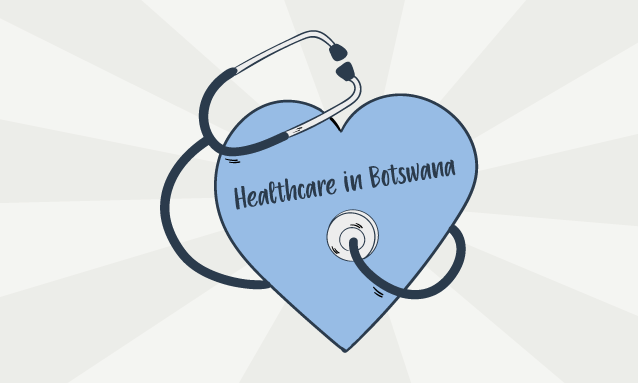
One of the most essential things we all prioritise when we consider moving to a foreign country is the quality and availability of healthcare. And rightly so, because nobody wants to be stuck in a foreign country, sick with no access to good quality medical assistance.
Luckily, if you’re considering moving to Botswana or are already headed this way, you’ll be glad to know that there’s a variety of options available to you in terms of healthcare. Healthcare in Botswana is by no means the best, but by the same token, there are enough decent options to allay any fears you may naturally have.
Botswana’s healthcare system
Healthcare service delivery in Botswana is pluralistic; there are state-owned, private for-profit and private non-profit medical practices. Through the government, the Ministry of Health and Wellness is responsible for the provision of health services.
The Ministry of Health and Wellness
The Ministry of Health and wellness is mandated to deliver health services for Batswana free of charge. It is responsible for the formulation of health services policies, regulations, standards and guidelines. The ministry is also a major provider of health services through a wide range of healthcare facilities and management structures. It provides primary healthcare services through District Health Management Teams (DHMTs). DHMTs are responsible for running a network of health facilities, hospitals, clinics, health posts and mobile stops as well as community-based preventative and promotive services.
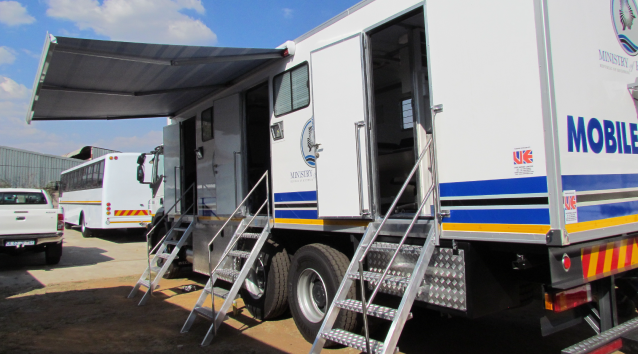
This means that wherever you are in Botswana, no matter how remote, there’s likely to be a state-owned medical unit of some sort within a fairly short distance.
The Ministry of Local Government (MLG)
The Ministry of Local Government provides some public health services including providing environmental health services.
Other service providers and facilities
Botswana also has a lot of private practices, a few private hospitals, some mine hospitals, NGOs and missions facilities across the country. The Botswana Defence Force (BDF), Police and Prisons Services also provide medical services to special groups.
The public sector dominates the health system in Botswana, operating 98% of the health facilities. While state-owned health facilities are a lot cheaper, there is a huge gap in quality between public and private medical provisions, with the former far worse off. My personal advice to expats would be to pay into a private medical health cover and stick with private facilities, and I’ll explain why. I would even go so far as to urge them to arrange an internationally recognised medical health cover before leaving home.
Very much like with the rest of Africa, the public healthcare system in Botswana mainly serves a lower-income bracket, while expats and those who can afford it use the private healthcare system. Additionally, some locals still rely on faith healing or herbalists, both of which currently operate informally, as the country is yet to regulate traditional medical practice.
Sadly; although there are adequate provisions in Botswana’s private hospitals, medical evacuation to neighbouring South Africa is common in serious cases as Botswana healthcare is still considered light years behind South Africa.
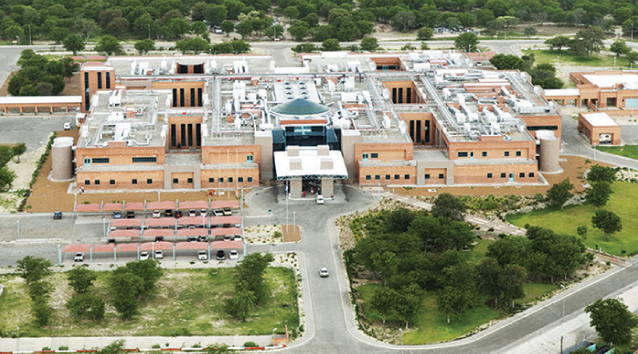
Maun Hospital, courtesy of Stefanutti Stocks
Public healthcare in Botswana
The country’s public healthcare system focuses on disease prevention, as one- quarter of adults are infected with HIV/AIDS. There are a number of non-governmental organisations providing mostly HIV/AIDS-related services such as counselling and testing.
In addition to the network of health facilities in Botswana, there are over 800 mobile services to populations in remote areas or those outside the 8 km radius of a health facility.
For foreign nationals who choose to use public health services, a nominal fee of *US$70 applies. Medical staff don’t always charge it, however. But they will want to see your papers showing that you’re allowed to remain in the country. So it’s advisable to take your passport along to show your residence and/or work permit.
Usual checks such as your weight and blood pressure are made before you’re issued with a medical card either in pink or blue. You may be more accustomed to having all your medical records held at your doctor’s. In Botswana, state-owned medical facilities charge you with the responsibility of looking after you own medical card.
Sexual reproductive health services and antiretroviral therapy services are free.
In my personal experience, Princess Marina Hospital is probably your best bet out of all the state medical facilities. The further away you go from Gaborone, the worse the quality of medical provisions become, the more limited the resources.
*This figure is subject to change. Please always refer to state facilities for the most up to date fees.
State healthcare facilities pros
- Besides the nominal fee charged, both the consultation and medication come free.
- There are many medical units.
- The standard of medical attention is very good.
- Medication, when available is very varied.
- The facilities are generally clean.
- Even in the face of ill health and indeed slow service, there is always something to laugh about in state facilities, as there always seems to be something comedic happening!
The cons
Random Fact: If you’re processing your resident and work permit, there’s a form you’ll need to have a doctor confirm that you’re neither an imbecile nor an idiot! Yes, very unfortunate, offensive and dated choice of words, but it does exist. I honestly feel the ministry needs to either get rid of this form or re-word the whole thing with immediate effect. What I fail to understand is just how you medically assess someone to determine whether they are an imbecile or an idiot.
Anyway, what you’re best off doing with the form is to go to a private practitioner and have them do it for you to avoid the long queues in state-owned facilities. Expect to pay anything from 150-pula/ $15.
The list below is by no means a swipe at government healthcare facilities. Yourbotswana appreciates that the government works tirelessly to care for its sick, and is to be commended for the provision of free healthcare services. This is especially worth being grateful for when you consider there are some developed countries whose citizens don’t enjoy the same privilege.
What this list and indeed the whole article seek to do is simply highlight the deficiencies in the system, which let’s face it, are glaringly obvious to those who use the services or work within the public health sector.
These are my observations:
Limited resources. You won’t always have immediate access to a doctor. Some practices only have a visiting doctor on certain days of the week.Doctors are over-stretched and often single-handedly work different sections of the facility. While you’re queuing in the outpatients section, your doctor may have to save the situation over at maternity while you wait indefinitely.
Equally, if high-security patients such as prisoners are brought in for special medical attention, all service halts and is re-directed to them until they’ve been seen to. While they have their own medical care staff, they aren’t always able to help them; in which case they are treated at state-owned facilities.
Hideously long queues that may require you to either queue up at the crack of dawn if you have any hope of being seen on the day. Arriving at say 10 am means you run the risk of camping out in the queue the whole day and possibly not being seen on the day. Most facilities typically operate the usual state hours; 0730-1630 hours.Going during the day almost always means longer delays, as priority is given to the elderly, pregnant women and school children. Regular patients, therefore, have to take it in turns to let them through. Queues aren’t as long outside normal work hours. However, you may have to wait for the doctor to come in much later. You don’t always know when exactly they’ll come in unless you ask other staff within the facility.
The lack of water fountains, a vending machine or small canteen, which are usually standard in other countries. I personally feel that not only would these resources come in very handy for visitors, staff and patients alike, they could also serve as a money spinner for state-owned facilities.
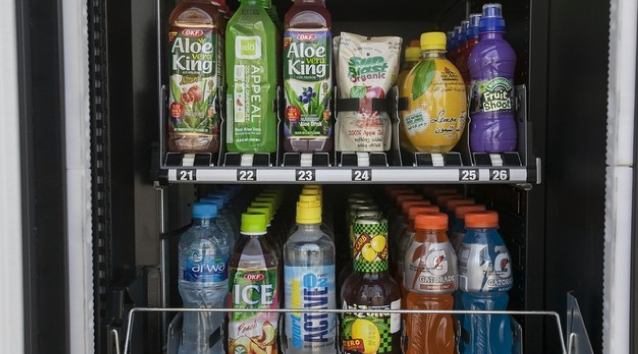
This for me is where the government is seriously missing a trick. A vending machine that’s stuffed full of basic items such as water, sandwiches and drinks could help so many people and create jobs that are very, very thin on the ground. A canteen would also create jobs. A small convenience store selling flowers, cards, magazines etc could also usher in more jobs. The possibilities are endless!
Very few facilities operate 24 hours. Of the ones that do, once you’ve seen the doctor and been given your prescription, you may not even be able to collect your meds because (for reasons I fail to fathom out) the dispensaries shut down at 1630 hours! You are therefore forced to return at another time or try to find an open facility and cross your fingers they have your meds in stock. It’s common to find the facility has run out.
Luckily, you can also opt to go to a pharmacy for them but of course, you have to pay for them out of your own pocket.
As stated above, if you’re lucky to be seen before the dispensary closes, you may find your meds are out of stock. If you can’t afford to buy them from a pharmacy, your next best option is to get up at the crack of dawn and go to Princess Marina Hospital to queue for them.
To beat the queue, you need to get there for say 06:30 hours in order to be at the top of the queue. That will almost certainly guarantee you are seen within an hour of the dispensary opening at 07:30 hours! Often, when other facilities have run out meds, the hospital has them.
*This applies only to Gaborone. For other towns, if you’ve been to a state clinic and found no meds, you’ll need to check with the local referral hospital.
The lack of communication by staff. For instance, if the doctor goes on a break or is called away on an emergency, it falls to you to find out what’s going on because the staff never volunteer the information.
The fact that you’re expected to queue up with everyone else and see the doctor just to get a signed repeat prescription adds to the frustration and is in my humble opinion, working harder, not smarter.
Repeat prescriptions. Nurses in most other countries I’ve been to usually get the doctor to process prescriptions, without the patient having to queue up and clog the queue unnecessarily. They tell you when your prescription is ready for you to pick up and you’re in and out of there within no time, without adding to the already bloated queue.
I think our public healthcare facilities could do well to adopt this system for all long-term conditions that require repeat prescriptions because it would go a long way to reduce the long queues.
While you sit there waiting and bored, you’ll observe there’s usually a TV set that you’ll no doubt stare at longingly and pray for it to go on. But sadly, TVs decorate the halls but are never switched on. Ok, this sounds irrelevant, but when you’re waiting for hours on end, even boring news playing on a loop would be welcome.
Lack of signage. The signages could do with boosting because if you don’t speak Setswana, it’s very easy to get confused as to where you are supposed to go. To be fair; this is a widespread problem across Botswana, everything is very poorly signposted! So you’ll find yourself having to ask where to go, what to do, where things are at every single turn. If you’re timid and aren’t the sort of person who finds it easy to ask strangers where things are, you’ll find it very daunting.
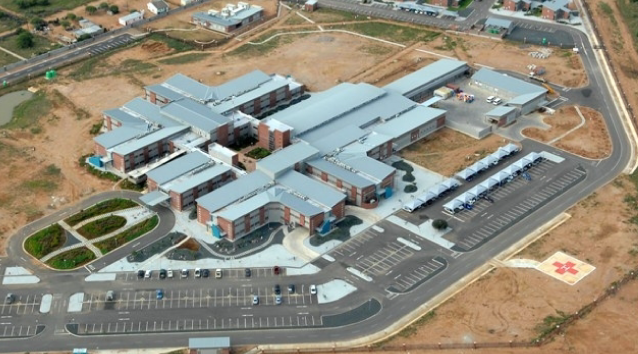
Bokamoso Private Hospital, Gaborone courtesy of The Electives Network.
Private Healthcare in Botswana
To ensure access to the best quality healthcare and medical treatment in Botswana, the best favour expats can do themselves is to invest in a good health plan, commonly known in Botswana as Medical Aid Covers. If you can, get one that’s internationally accepted before you leave home. There’s no shortage of Medical Aid providers in Botswana, and the list includes Bomaid, Pula Medical Aid Fund and Symphony Medical Aid, just to name a few.
I currently don’t pay into one, so I can’t vouch for any right now.
Expats coming from the UK will be happy to know that many private practices accept BUPA medical cover. But you can only use it if you set it up before you leave the UK. You’re not able to make a fresh application for it once you’ve left the UK. Please do not fall for any scams that tell you otherwise, because I have already done the legwork and know from BUPA that for now, it’s not possible.
Doctors in Botswana’s private hospitals and other facilities are world educated, returning to Botswana to practice medicine. This means there is no shortage of skilled medical staff within the country.
Private healthcare in Botswana is expensive, so an adequate health insurance policy is recommended to pay for the cost of treatments. If you do decide to pay into a private health cover, I’d urge you to shop around for one that best suits your medical needs and budget. Once you’ve decided on one, you’ll then need to pay a monthly fee. Each time you go to the doctor’s, you’ll only pay a percentage of the fee charged, with your medical cover taking care of the rest. Some providers cheekily stipulate that you pay all the fees and retrospectively claim the money back, which to me is just ludicrous.
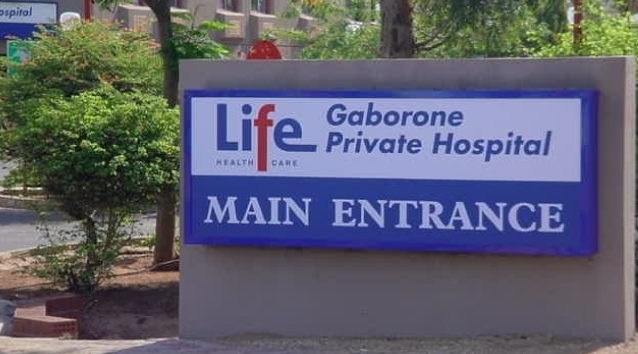
Courtesy of The Electives Network.
I would urge expats in Botswana to choose a health plan that covers medical evacuation, should the need ever arise. If you have a long-term health condition (chronic) such as epilepsy, asthma, angina and diabetes, prepare to pay through the nose, as monthly instalments soar exponentially to eye-watering proportions, which is why I’ve reached a stalemate in so far as settling on one medical aid cover. What’s worse, you’ll be expected to pay into the cover for anything between 12-24 months before you can actually use the cover towards your long-term condition!
When I started looking into getting medical aid, I even asked a few local medical aid providers if I could tap into the cover immediately if I paid all the money upfront in one fell swoop (to cover 24 months). Sadly, standard policy procedure across the providers I approached dictates that even where you pay a lump sum upfront, you sadly have to wait the stipulated length of time before you can benefit from the cover! I found it shocking that while they would be happy to grab your money, they wouldn’t return the favour.

Courtesy of General News.
Vaccines you’ll need before moving to Botswana
Expats moving to Botswana should be fully vaccinated for the following diseases before departure:
- Hepatitis A
- Typhoid
- Hepatitis B
- Rabies
- Yellow fever
Additionally, health experts advise expats to take Malaria prevention meds before departure if they are headed for the Central, Chobe, Gantsi, Northeast, and Northwest districts, which are Malaria-prone. Although I’m by no means an expert, I’d encourage all to take them regardless of where in Botswana they’ll be based. Before we left the UK, our doctor advised my English husband to take them and so he did. We are based in the capital Gaborone, where Malaria’s usually not a problem. He also took them on previous visits before we made our final move about three years ago. Transmission occurs mainly from November to June.
Although there’s usually no risk of Malaria in Francistown and Gaborone cities, this year owing to the heavy downpours brought about by Cyclone Dineo, Botswana has seen Malaria cases soar and even occur in the most unlikely of places.
Bonus point!
An estimated 25% of Botswana’s population is infected with HIV/AIDS. This shouldn’t be of much concern to expats, as long as they know to take the usual precautions to safeguard their health.
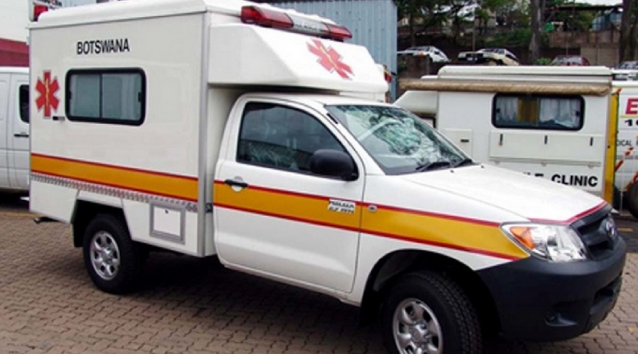
Emergency Services in Botswana
Emergency Medical Services (EMS) is a type of emergency service dedicated to providing out-of-hospital emergency medical care, transport to definitive care, and other medical transport of patients with illnesses and injuries, which prevent the patient from transporting themselves to wherever they need to go to receive medical attention.
How the Ministry of Health Wellness EMS works
The ministry defines an emergency as any life-threatening situation resulting from an illness or accident, which requires urgent treatment and transport to a medical facility.
The government established the EMS in response to the burden of the high incidence of deaths and disabilities resulting from accidents and emergencies.
The government also recognised the need to improve emergency response to accidents and medical emergencies happening in the out of a hospital setting, such as at home and road traffic accidents.
- In case of an emergency, you need to dial 997 for assistance.
- Patients are categorised by priority according to the most urgent
- An ambulance is dispatched to the scene
- The dispatcher will call back to collect more information about the patient
- An ambulance may be diverted en route to go and assist a patient considered more critical.
What the EMS does NOT cover
Please note, while these are obvious to some, I’m listing them for clarity for those who may genuinely not know.
- The EMS does not transport dead patients
- Patients who need blood tests and x-rays are expected to transport themselves
- Patients who are stable and need to go for check-ups
- Non-urgent patients referred to other health care facilities
- Patients refusing hospital treatment in government facilities seeking transfer to private facilities. This excludes paediatric patients under thirteen years old who will be transferred and proof of admission verified. In this instance, the patient’s nurse or doctor calls for the ambulance.
- The EMS does not return patients home or to the referring clinic once treatment has been administered.
Did you enjoy or find this article useful? Please spread awareness by sharing it or pass it onto someone you feel could use the information. Also, if you have something to add a comment, you’re most welcome to do so.
Reference: www.moh.gov.bw / www.expatarrivals.com
Mobile clinic image courtesy of unitexport.com

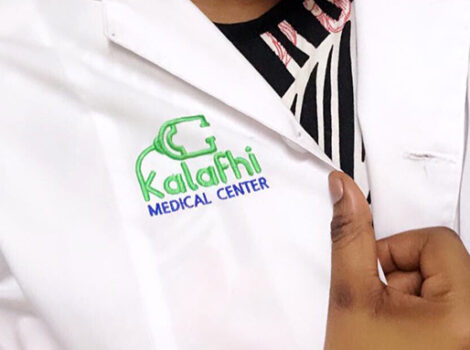
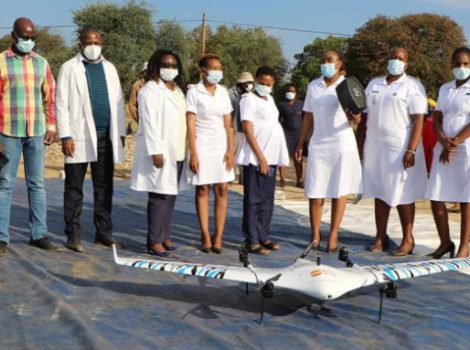

Informative! Thanks…
Thank you, this information is very useful…
Thank you very much.I rilly value this information as it is informative.
Insightful information. Thanks for sharing and keep on updating more information about our health care system.
Help me get links in the medical field as Laboratory Technician… Thanks.
insightful information, thank you
thank you very much for these information, it is helpful
Thank you for sharing the information…..
Thank you for sharing this very informative article. I’ll surely post it to friends.